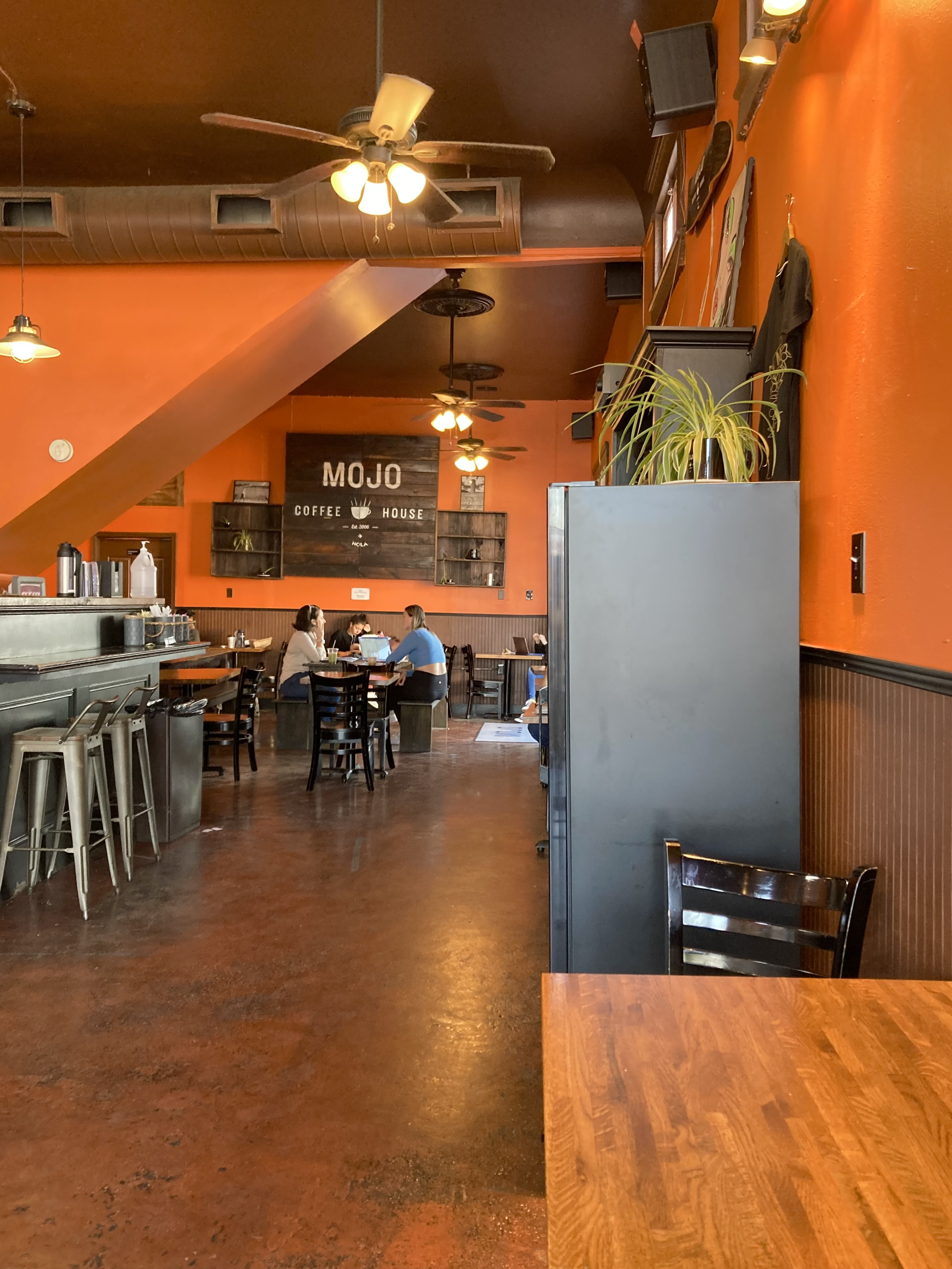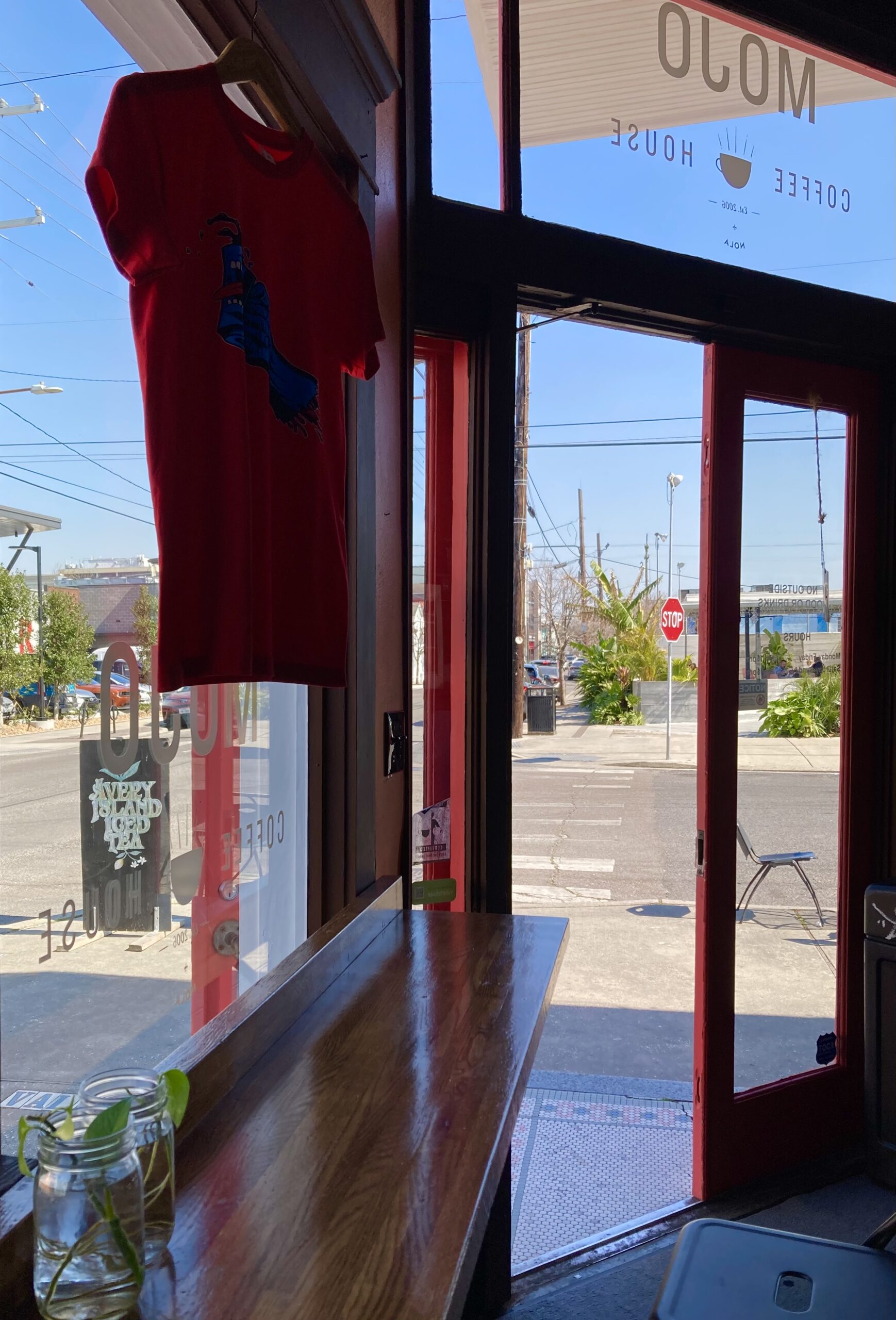
Where the magic happens
Photo by: Ayelet Blumovitz
Mojo coffee house leaves the front door open in the morning. When it’s above sixty-five degrees and the New Orleans rain finally stops, about 10 feet before entry, the smell of freshly brewed Colombian dark roast with notes of poetry and dreams spills outside the shop. A barista wearing saggy jeans says, “welcome in”; their wave exposing tattoo-clad arms with beautifully mysterious images.
In the open dining area, adults speak of political, economic, or cultural issues with their coworkers, sipping hot coffee and writing in notepads. Students with AirPods study STEM on laptops, drinking iced coffees larger than their heads while local workers come in before their shift, or during, or after, looking for a warm drink or a friend. It took spending hours procrastinating homework and eavesdropping on strangers, respectfully, for me to notice just how many people are ordering oat milk iced coffee or kissing their same-sex partners. Some days I walked in with eyeliner, some days without. When I started walking in with baggy men’s pants, the baristas would still smile at me, and when I cut my hair they complimented it. Little pride flags hidden on the bar make their way to the eyes that are looking for them — and for the people who are, this private invitation means the world.
The coffee house stands its grounds on 4700 Freret Street in Uptown, New Orleans. Grounds that were once unsteady, but now carry the Freret Renaissance on their shoulder. The boom in businesses and culture on just seven blocks of New Orleans-style paved streets swept with it a diverse crowd with many opinions and ideas. This crowd, though composed greatly of Tulane and Loyola students, holds innate care for the city and hopes of making it better. Even Southern Decadence, a tradition that many New Orleanians take pride in today, began with just a few Tulane students in the 70’s and a themed party. Much like other cities, flower power in New Orleans was not met with open arms and watering cans, even if it came from the privileged elite. Though the efforts of many people were made, and endless protests took effect, the queer community still enters establishments wondering if they will be safe.
Maslow’s hierarchy of needs argues that physiological necessities are the foundation for all human needs and come before personal security. In a crime-filled city, many times physiological needs and health are compromised, psychological health included. For the queer community, the justified anxiety around harassment has been compounded in the past few years. In Louisiana, even social media presence proves dangerous. Queer people are often left with little resources for finding community. The adaptation throughout history resulted in different forms of public and secretive gatherings, the most commonly referred-to example: gay bars; and even those become a hazard, maybe they’re too apparent. Among other historically queer spaces, coffee shops have often turned discourse into curiosity bringing with it the sexually curious as well. The nuance that came with this form of sexual liberation kept coffee houses a case study for cultural effects of well-hidden sexual freedom.
In the late Ottoman Empire, coffee houses were well known as hubs for gay males where their experimentation with same-sex intercourse was seen as nothing other than just that. Before any structural enforcement against same-sex relationships, the people that gathered there were among the most educated and well-respected. When homoeroticism in the empire shifted in principle from a societal norm to a propagandized phenomenon, the attack on coffee followed suit. In 1662 the Ottoman government prohibited coffee houses and set a law for the execution of coffee drinkers. To us nowadays, it seems a bit extreme to execute coffee drinkers, — let them eat coffee beans, I guess — but the coffee executions of 1662 were the Compton Cafeteria riot of 1966 and the Pulse shooting of 2016. Queer people stay trying to separate the historical trauma of ‘safe’ spaces from their daily life, including their morning joe…

Mojo’s front door: left open for a cool breeze
Photo by: Ayelet Blumovitz
With the rise of third-wave coffee, traditions are being broken. Customers are much more concerned with the quality and origin of their coffee, and the diversity in their brand’s identities. At Mojo, the baristas are carefully chosen, and their community is nurtured with every hand-sorted, local batch of coffee. This street-corner coffee shop, with grungy graphic tee’s hung on curtain rods, and little plants sat along broken shelves, invites the mildly angry, power-hungry professional, the sleep-deprived college student, and the overworked across-the-street mechanic. All sipping side by side. Legendary Drag Queen, RuPaul once said, “We are all born naked and the rest is drag,” and so it goes, Mojo coffee house will let them eat cake, and drink oat lattes, in whatever form of drag they decide to do that.
 NOLAbeings Multimedia artist Claire Bangser created NOLAbeings as a portrait-based story project that marries...
NOLAbeings Multimedia artist Claire Bangser created NOLAbeings as a portrait-based story project that marries...  Voodoo in New Orleans: Reviving history: New Orleans fortune telling This article takes a deep dive into the history of Voodoo in New Orleans, its hybridization with Catholicism, and its present-day place in the city's culture. The author visits fortune-tellers in the French Quarter, using their guidance as a tool for introspection rather than a deterministic predictor of the future. Through her experiences in New Orleans, the author feels a mystical connection to both the past and the future.
Voodoo in New Orleans: Reviving history: New Orleans fortune telling This article takes a deep dive into the history of Voodoo in New Orleans, its hybridization with Catholicism, and its present-day place in the city's culture. The author visits fortune-tellers in the French Quarter, using their guidance as a tool for introspection rather than a deterministic predictor of the future. Through her experiences in New Orleans, the author feels a mystical connection to both the past and the future. 